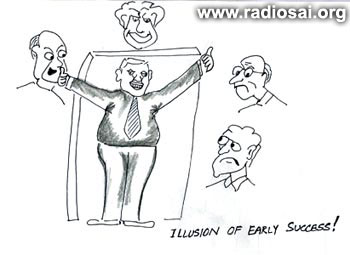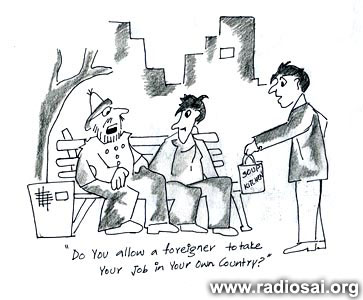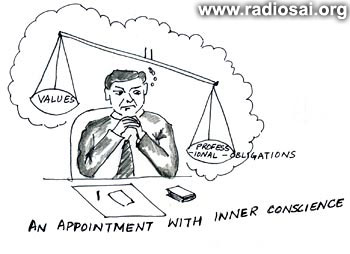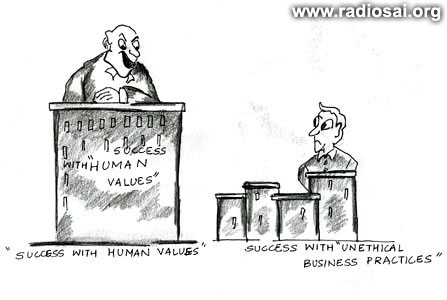 |
 |
 |
Volume
7 - Issue 01
JANUARY - 2009 |
HARNESSING THE HEART - PART 14
Living Up to the Challenge of Conscience in Daily Life
By Mr. Sai Mudigonda
ENCOUNTER WITH VALUES Even though I was brought up in a devout family and values have been driven into me right from the childhood, the wisdom related to the practical application came much later with experience. And now, the significance of Values is even more reinforced in me. The ‘Aggressive’ Global Manager Five years ago, when I was with a global company, I was managing a large multi-million dollar assignment covering multiple countries including India and the USA. I managed a team of around 250 employees at my base location in USA, where I was stationed for the assignment. We promoted the offshore/onshore Operating Model, highlighting the economies of scale and utilising the resource skills and expertise from various parts of the world. In this business model, a good amount of work was to move from USA to India – it was a simple cost saving model, since qualified labour was available in India at a significantly cheaper cost. Initially I worked as a Senior Financial Consultant and Business Manager for 2 years. Later I was promoted as Business Development & Relationship Manager. My performance was to be measured based on revenue growth, profitability, client relationship management and employee care. But the highest focus primarily was on revenue growth. Reaping a Bonanza
To accomplish my objectives, I started with a strategic business planning exercise and created an aggressive business plan. This strategy demanded some change in the work style and adjustment from my peers too. Later, I realised that they perceived it as threat since they were non-collaborative. In the first year, our performance was better than planned. We did 5 times the original target of 2 Million USD and ended up with a 10 Million USD for year 1. I was instantly recognised within the company. Motivated by my success, in the 2nd year I pursued a similar aggressive business plan. We forcefully upped the target to 2.5 times of the 10 million achieved. We managed to achieve a growth that was twice the previous years and I was duly recognised with certification and awards for the effort. ‘The mind of a superior man is conversant with righteousness. The mind of the mean man is conversant with gain.’ ~ Confucius Unanswered Questions for the Conscience While this was going on there were many things which were actually falling apart. Situation 1:
Moving work to India at this rate impacted the jobs in my client company in the USA. The local employees who lost their jobs became restless and started their agitation through media against their management as well as my company. One such employee who lost the job had to sell his house for lack of income and ended up in a divorce as a consequence of this. In one of the ‘Soup Kitchen’ service activities (Narayana Seva), this employee was part of the homeless guests. He recognised me and asked, “Do you allow a foreigner to take your job in your own country?” He was very polite, and asked this without any aggression. I was stunned and surprised at his question. I had justified this on business terms, but deep inside my heart, I was not satisfied with this rationalisation. I could not answer him. Situation 2: Due to the perceived job insecurity, the client company’s managers and other employees made daily operations difficult. In spite of various trust building exercises we failed to build a cohesive and motivated environment. In that chaotic situation, some of the client managers and employees started a pre-emptive exercise of building strong non-job related relationships with my next level staff to safeguard their jobs. In one of my client relationship building exercises, a senior manager asked me a question: “Friend, I am not sure if I am going to be around in my job to maintain a business relationship with you or with your company. My question to you is: Can you offer me a job in your team if my company gives me a pink slip tomorrow? Your answer would help me to decide my next course of action”. Again, I had a business justification, but something in me was not happy. ‘Social equity can't be left to market forces.’ Situation 3: My peers, for their own good reasons, did not pursue aggressive revenue growth plans in their assignments. Excessive revenue growth generated in my assignment caused imbalance in their teams and their career aspirations. I caused this indirectly by stretching the boundaries beyond normal growth levels. Though some of them made their best effort to compete fervently, we could not create a healthy competition amongst us and thus failed to create a collaborative environment. This also created opportunity for competitor companies to gain a share from our business. Situation 4:
All this was leading to an unhealthy work environment. I sensed the low morale in our teams. Most of the key performers started opting out of the assignment or the company itself; some joined our competition. There was a ‘work to rule’ attitude and people were complaining about other peers or their managers. This lead into productivity and quality related challenges for the client. Employee commitment levels went down and most employees ensured that their fellow employees did not get any positive recognition. One of the employees asked me a question: “What do you mean by joy at work? Can you please help me to experience how can I be happy in our current situation?” I could not answer him. An Appointment with the Inner Self
I did the best I could to fulfill my professional obligations. In fact, I surpassed expectations! I did work hard and for long durations to do what I understood and believed were my professional objectives. In spite of big gains and unexpected growth, things were not going right and were falling apart subtly and internally, though everything appeared commercially successful. I knew I had to undergo some self-introspection to find the reason. For the most part of my initial years, I was in pursuit of revenue growth, but the above developments showed that there was something basically missing. This led me into an introspective mode. I could see the implications of these actions by the end of the second phase. Initially I was under the impression that the business of my company was to enable our client to increase the overall operational capacity to execute major projects. Initially, I believed strongly in this concept as it seemed to lead to a win-win situation of creating employment in both the companies and in both the countries.
However, there was more to it than the above. The process would have started with that intention but it got buried under the greed to grow exponentially. At that point, though the external world perceived me as a successful manager in business terms, various unanswered questions raised in different situations made me realise the thorny issues which have accompanied this ‘success’. More Intriguing Questions! The self-enquiry resulted in me asking certain questions, which, I wish I had asked at the beginning.
Taking Control and Finding True Success I could see that many of these questions in my mind were coming too late. These were mostly beyond my control, but I could have acted on some of them at the right time. I had to do something to check the situation. The only way I could think was to evaluate everything from the Human Values perspective. Without impacting the basic process and the business structure I wanted to work on my team, as that was something I was primarily responsible for and over which I also had control. My primary focus started with improving team morale and curbing the attrition. I arranged meetings with each of the key team members and identified their career and personal aspirations. I made sincere and concerted efforts to address their individual needs in a more involved manner. Things surprisingly started looking up. Within the first 6 months, I could enable 90% of my team to get back to working in a committed manner.
I had to re-evaluate my business plan to find a solution to the client employees losing their jobs. I identified areas of work which did not impact their employment and aimed to move only those activities to India, even though I lost some business to competitors in the process. I communicated this revised plan to the client management team. It was a surprise to them. They also agreed and supported it, as they were facing internal hostility due to the poor work situation. While this was going on, our fluctuating client relationship started getting some positive attention. I proposed a Shared Managerial Responsibility Model wherein both client managers and my managers collaborate, and execute their given assignments as paired teams. This helped client managers feel more stable and involved in their jobs without feeling insecure. This built mutual trust and brought stability to the business relationship. The lack of collaboration amongst peers was a tough one to address. It took almost 9 months of compromising, sacrificing a part of my success and working together as a team to build the mutual trust. Initially I started sharing my success with them and created opportunities for some of my disgruntled peers to grow along with me. Also, I initiated a few team activities for fun and also got ourselves involved in some community service activities. At the end of 9 months, I got 75% of my peers collaborating with me. The results were very satisfying. However, after 6 months, the management of the client company in the USA changed. They cancelled assignments half way through. Their decision was aimed to help keep their local employment intact without losing jobs to foreign countries for the sake of low cost. More than 50% of the business was lost in a year’s time. Many moved out of the company to pursue a specialist type of work where they started deriving more joy at work. The Learning Curve To summarise all that I learnt from the above painful experience:
If core Human Values are ignored in business, there is a huge hazard of overall disharmony, which would be veiled by the illusion of the short term commercial benefits. 'If you think of vision and mission as an organization's head and heart, the values it holds are its soul.' ~ Buzotta Such situations will eventually trigger a natural corrective process. But predicting the time frame for such corrective action may not be possible. It could be a few months or some times a life time. In my case it took 3 to 5 years to acknowledge that change. At the same time, managers must recognize the critical requirement of proactively building in the ‘Human Values’ approach into any strategic plan. Or else, some of the repercussions of ignoring these values are too painful and also too difficult and time consuming to correct. These also have huge costs, including social, which might have global implications, if the company is structured that way.
It is certain that Core Values bounce to correct any such situation, independent of our involvement. By being part of that bouncing process, there is a tremendous amount of valuable life time learning for the individual. It is a privilege and good fortune to experience human Values becoming victorious over unethical business practices. Core Human Values are the reflection of the innate nature of human beings. They are installed in human beings by none other than God. They are bound to be victorious in the end. Illustrations: Mr. S. Sai Aditya
. |
Vol 7 Issue 01 - JANUARY 2009
|
|
DHTML Menu by Milonic |
| Story from Heart to Heart E-Magazine: https://archive.sssmediacentre.org/Journals © H2H 2009 |





